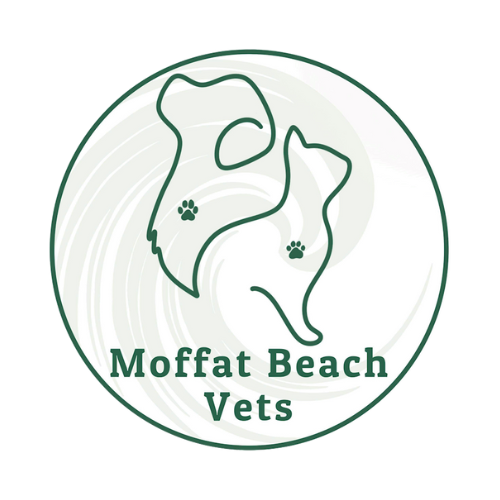Dog Vaccinations & Health Checks
Combine your dog’s annual vaccinations with a health check to minimise vet trips and keep their tail wagging all year. We use a caring and gentle approach to put your pup at ease during their visit.

Trustindex verifies that the original source of the review is Google. Always greeted with a warm welcome, vets and nurses are all so kind and caringTrustindex verifies that the original source of the review is Google. One of the best and caring vets I've been to.Trustindex verifies that the original source of the review is Google. They helped bring a little comfort and kindness during an otherwise heartbreaking time.Trustindex verifies that the original source of the review is Google. These ladies (and Tim!) are the best in the business in my opinion. They were so patient and loving with my boy Marvin, they were helpful and answered any and all questions I had. He was spoilt rotten with cuddles and treats and I can bet he is excited for his next visit already. Thank you to the Moffat Beach Vets team!!Trustindex verifies that the original source of the review is Google. My first visit to your Veterinary Practice where I registered my little dog Georgie Girl. It was a wonderful experience. Dr Belinda who examined Georgie was amazing and suggested a number of things that may help towards Georgie 's wellbeing. I would have no hesitation in recommending Dr Belinda at Moffat Beach Vets to my friends. She was so easy to talk to and Georgie was so relaxed when she was examined, which is normally unusual for her. The Vet Nurse Taylor was also very friendly and helpful. I would definitely let all my friends know about Moffat Beach Vets.Trustindex verifies that the original source of the review is Google. Brilliant and super friendly and helpfulTrustindex verifies that the original source of the review is Google. All staff are welcoming and knowledgeable!! They make it so easier for me to book my pet in around work schedules which I appreciate!! Staff are always happy to see you and conversations are so easy!Trustindex verifies that the original source of the review is Google. My fur baby Bella who is a rescue hates anyone thats breathing an warm red blood running through their veins. I'm not joking. Thanks to the wonderful staff they can not only wash her but clip her nails. I have 3 fur babies an I never have to drag them in there. Powderpuff actually runs in there to greet them. The first 2 months of taking Bella to get groomed they call me to say they can't get her to come out of the cage. I kept taking her there an they finally won her over.Verified by TrustindexTrustindex verified badge is the Universal Symbol of Trust. Only the greatest companies can get the verified badge who has a review score above 4.5, based on customer reviews over the past 12 months. Read more
Give Your Dog the Best Life Possible
Immunity from puppy vaccination weakens over time, leaving your dog susceptible to disease. Annual canine vaccinations combined with a comprehensive health check allows your pup to live its best life.
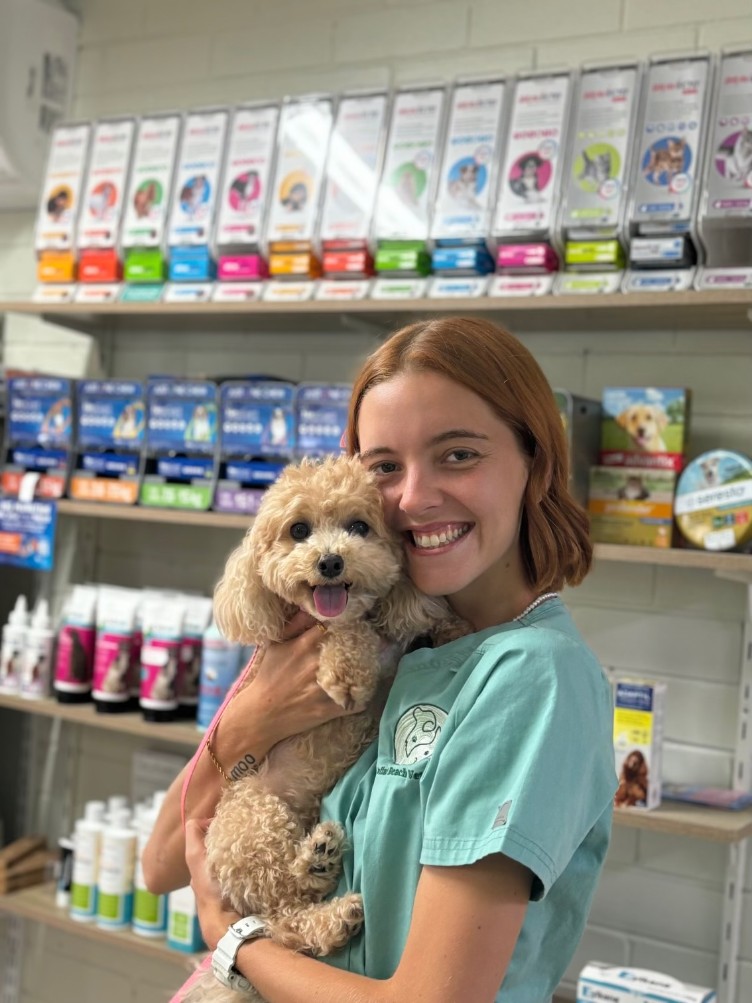
What Our $95 Nose to Tail Exam Includes

Physical Examination
Eyes, ears, mouth, gums, lymph nodes, legs, abdomen, lumps & bumps.

Diagnostic Exam
TPR Check: Temperature, Pulse, & Respiration. + Blood & urine tests as needed (lab fees apply).

Annual Vaccination +$45
C4 Vaccination, C5 Vaccination, heart worm injections, Bravecto Quantum.

Chat With Vet
Annual health checks are a great opportunity to ask us about nutrition, behaviour, training, preventative care and more.
Did you know?
Dogs age 5–8 times faster than humans.
By age two, most pets have already reached adulthood. At age four, many are entering middle age. By age seven, many dogs, particularly larger breed dogs, are entering their senior years.
Expedited ageing can lead to rapid health changes in your dog, increasing their risk of conditions like cancer, diabetes, arthritis, heart disease, and more.
Regular clinic visits help diagnose, treat, or prevent health issues before they become severe. We also recommend routine vaccinations and parasite control for fleas, ticks, mites, heartworm, and intestinal worms.
Yearly Vaccines Recommended for Dogs
C5 Vaccinations
C5 vaccinations protect your dog from:
- Parvovirus: diarrhoea & vomiting, potentially fatal.
- Canine Hepatitis – can result in permanent liver damage and failure.
- Canine Distemper: coughing, diarrhoea, seizures, loss of balance and blindness.
- Canine Parainfluenza – highly contagious, respiratory issues lead to kennel cough.
- Kennel cough (Bordetella) – Hacking cough, runny nose, sneezing, appetite loss, lethargy.
C5 vaccines are especially important if you plan to board your dog during holidays or if they’ll interact with unfamiliar dogs.
Heartworm Injections
A yearly heartworm injection slow-releases formula that provides yearly protection for your dog. It can be administered alongside your pet’s vaccinations and it eliminates the need for monthly heartworm pills or chewables.
Heartworm may cause no clinical signs in the early stages of infestation, but as the worms grow and mature, they can interfere with the normal circulation of blood.
This can result in signs of heart failure, and in some cases may lead to sudden death.
Bravecto Quantum
Bravecto Quantum protects your dog from fleas and ticks year-long after a one injection.
One injection will effectively control flea and tick infestations on your dog within 2 days of treatment.
Starting from day 6, fleas are eliminated within 24 hours of infestation before they can lay eggs. Ticks are also killed within 2 days of treatment or infestation.
Health Care for Senior Dogs
If your dog is 7+ years old, they are considered a senior dog.
Older pets often face health challenges such as hearing loss, vision loss, arthritis, heart disease, cataracts, organ failure or cancer.
Regular health check-ups with Moffat Beach Vets can help identify potential problems early, ensuring your senior pet enjoys a long and happy life.
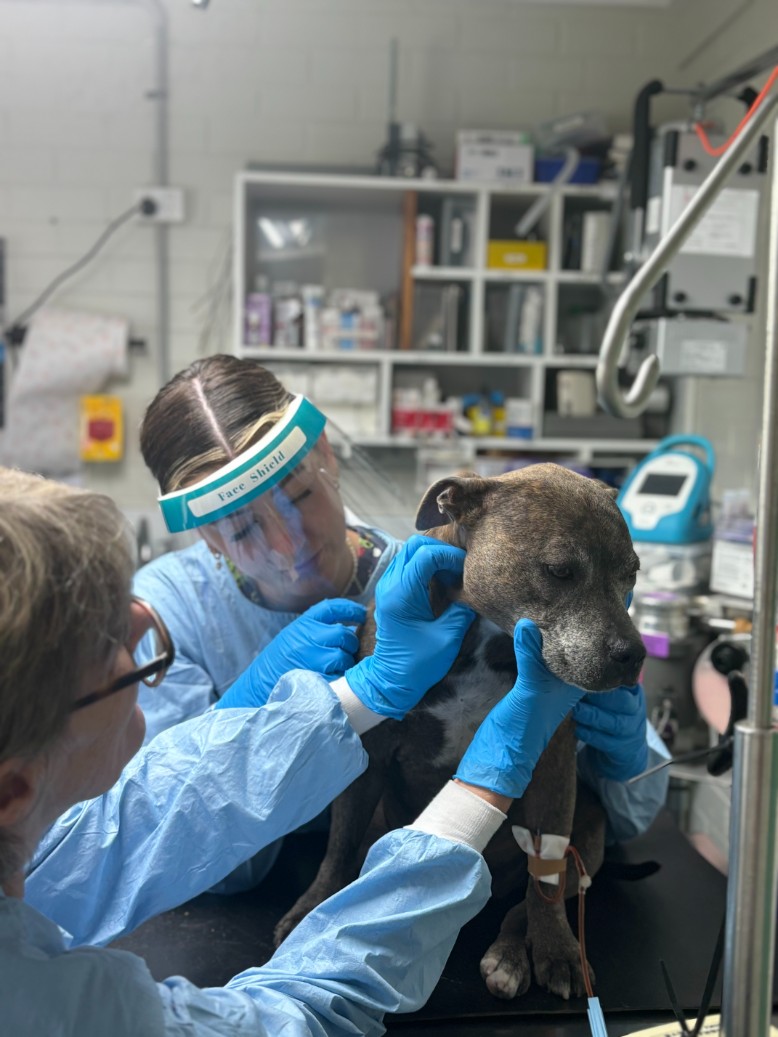
Calm Visits With Our Fear Free Approach
At our veterinary clinic, you’ll be fully supported with sound advice for your dog.
As part of our service, we help you understand the health care and treatment options available to your canine, even those that can be implemented before or after your visit to calm your pet. Ask our team about this today!
With good advice and professional recommendations, you’ll be well equipped to make the best health care decisions for your pet.
What to Expect from Our Clinic

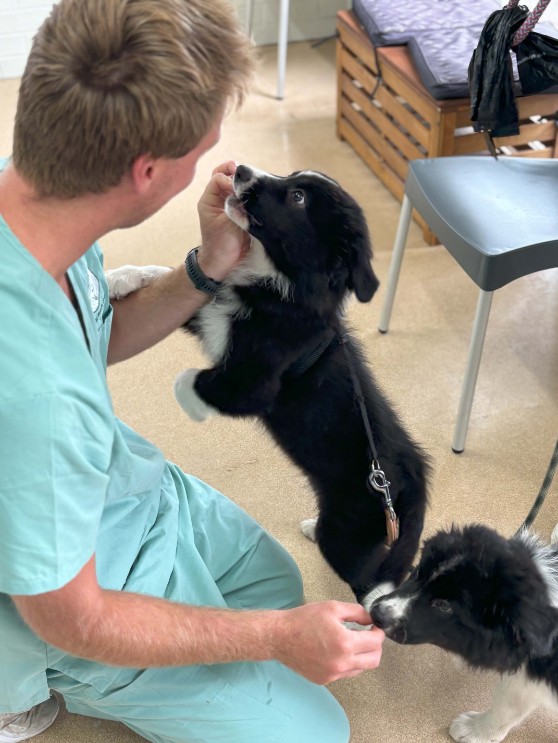
Prompt Service
We have a range of methods and practices that we can use to ensure your pet has an anxiety free visit at our Caloundra area clinic. Enquire about these with our team.
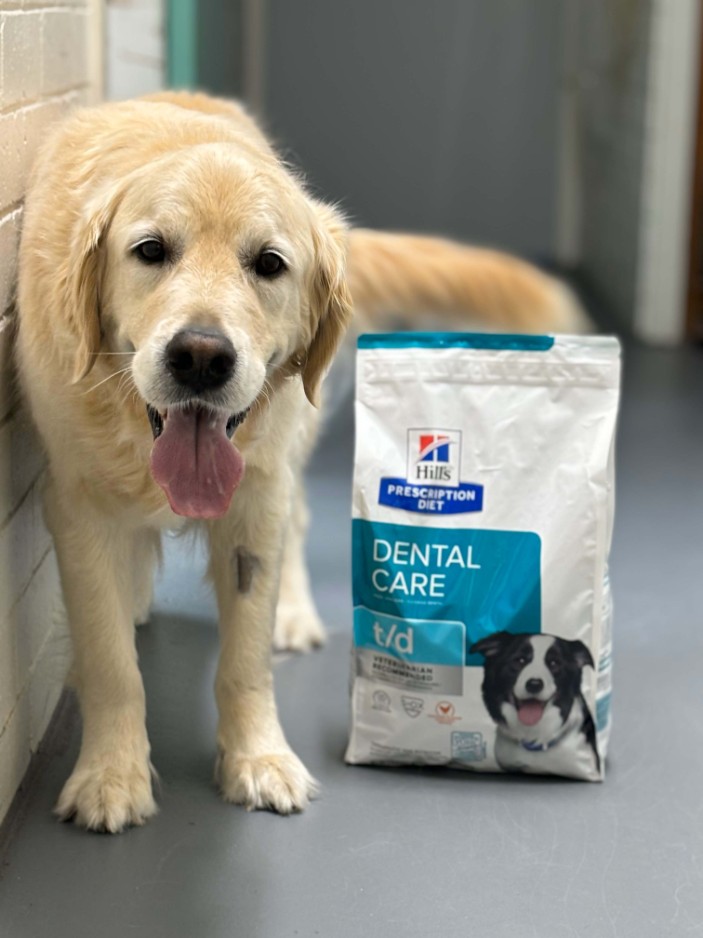
Fear Free Approach
Whether it’s offering extra cuddles, taking things slow, or just being a familiar, friendly face, your pet’s comfort is always our top priority.
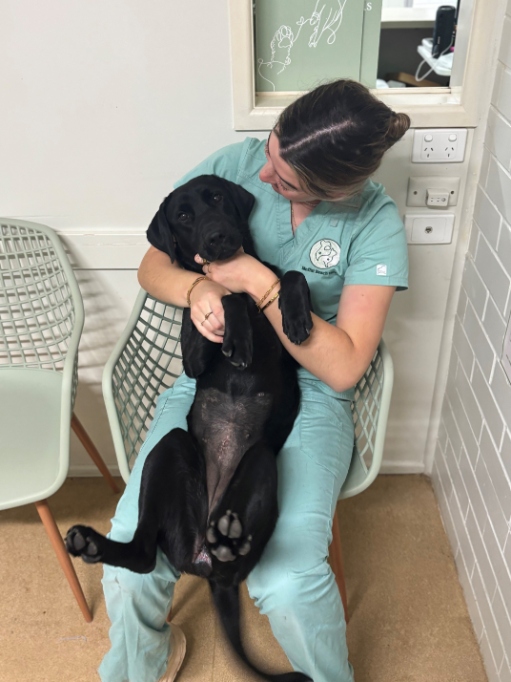
Caring Staff
Our team treats your pet like family. With gentle hands and a true love for animals, we do everything we can to make your fur baby feel safe, calm, and cared for throughout their visit.
Puppy Vaccinations
Puppies are temporarily protected against many diseases by antibodies received through their mother’s milk.
These maternal antibodies decline in the first few weeks of their lives, after which they need a vaccination to induce immunity.
The age at which maternal antibodies drop enough to require shots is highly variable, which is why a series of vaccinations is necessary in a puppy.
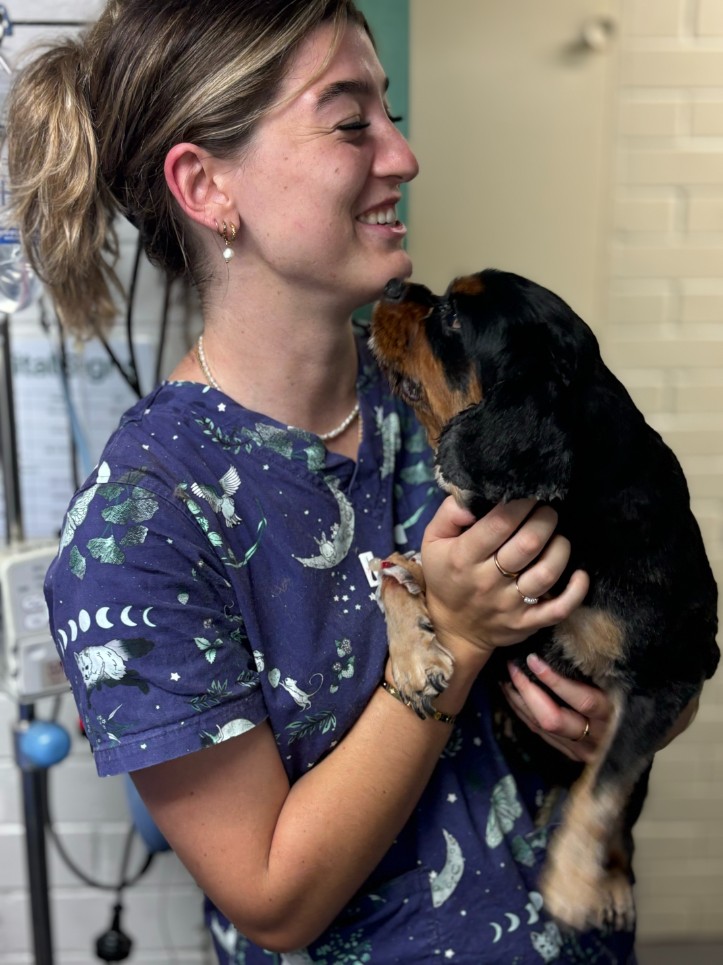
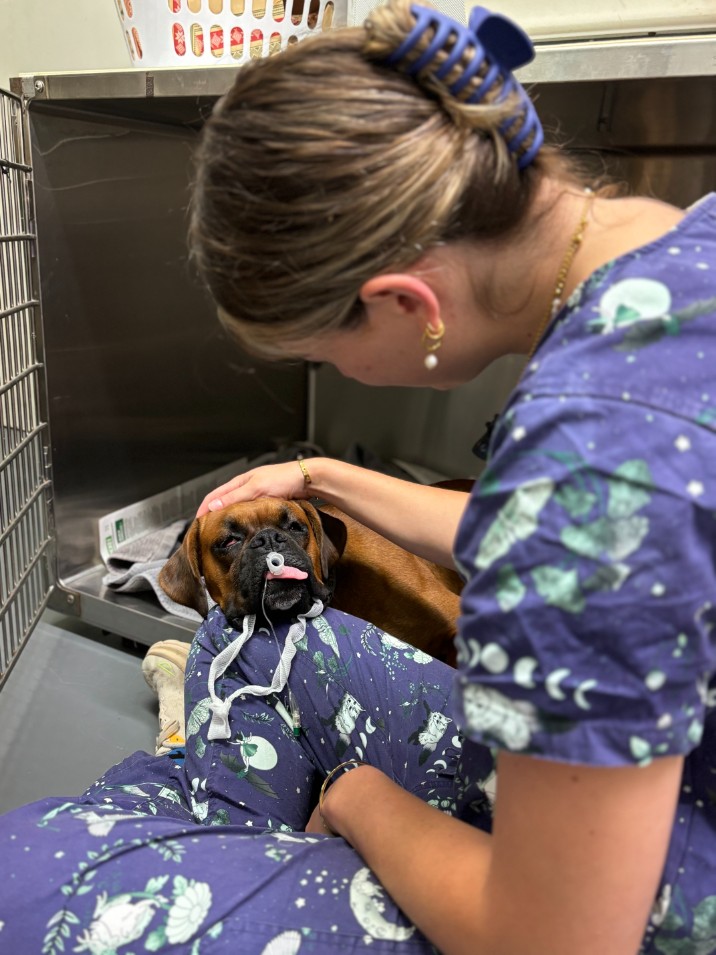
Common Diseases that Affect Dogs
Responsible pet care requires puppies to be given their initial course of vaccinations, but this cannot protect them for the rest of their lives. Adult dogs require annual shots to maintain immunity against disease.
Canine Parvovirus
Canine parvovirus is a disease that affects dogs of all ages but is most common in young dogs. The virus attacks the intestines causing bloody diarrhoea, uncontrollable vomiting and severe abdominal pain. Some infected dogs will die from parvovirus, even if they receive intensive veterinary care.
Parvovirus is spread via dog faeces and is very persistent in the environment even after the faeces has been cleaned away. For this reason, it is not necessary to have direct contact with other dogs for the disease to be spread. The virus is so persistent that an infected dog’s environment needs to be cleaned with a potent disinfectant to prevent spread to other dogs. Outbreaks occur regularly especially in summer, with an estimated 20,000 dogs infected every year in Australia.
Canine Distemper Virus
Canine distemper is a highly contagious viral disease that can affect dogs of any age with young puppies being at highest risk.
Symptoms vary but can include fever, coughing, sneezing, nasal discharge, vomiting, diarrhoea, loss of appetite and depression. Muscle tremors, fits and paralysis may occur later in the disease. Treatment is usually ineffective and the recovery rate very low. Dogs that do recover may have permanent brain damage.
Canine Cough
Canine cough is a condition produced by several highly infectious viruses and bacteria, which can be easily spread wherever dogs congregate, such as parks, grooming salons, doggy day care, shows, obedience schools and boarding kennels. Among the infectious agents associated with canine cough is the bacterium known as Bordetella bronchiseptica and the canine viruses parainfluenza, adenovirus type 2 and distemper.
Affected dogs have a dry hacking cough which can persist for several weeks. It is distressing for pet dogs and their owners. It is a major problem for working and sporting dogs. Pneumonia can also be a consequence of infection, particularly in young animals .
Canine Leptospirosis
Infectious Canine Hepatitis (Canine Adenovirus Type 1)
Infectious canine hepatitis is a viral disease which, like distemper is extremely contagious and often fatal. Dogs of any age can become infected, however severe cases are rare in dogs over two years of age.
Symptoms include high fever, depression, loss of appetite, vomiting, diarrhoea and acute abdominal pain. In severe cases death can occur within 24 to 36 hours. Dogs that recover may develop long-term liver and kidney problems and can act as carriers spreading the disease to other dogs for many months.
Canine Coronavirus
Canine distemper is a highly contagious viral disease that can affect dogs of any age with young puppies being at highest risk.
Symptoms vary but can include fever, coughing, sneezing, nasal discharge, vomiting, diarrhoea, loss of appetite and depression. Muscle tremors, fits and paralysis may occur later in the disease. Treatment is usually ineffective and the recovery rate very low. Dogs that do recover may have permanent brain damage.
Common Questions About Canine Health Checks
Everything you need to know about your dog’s annual trip to the vet. Can’t find an answer? Contact our team.
Do dogs need annual health checks?
Yes, dogs should have annual health checks to ensure they are healthy and to catch any potential health issues early.
Regular checkups help monitor weight, dental health, mobility, and detect early signs of diseases such as arthritis, heart disease, or diabetes.
Why are regular vet checkups important?
How long can a dog go without going to the vet?
A healthy adult dog should visit the vet at least once a year.
Puppies, senior dogs, and those with medical conditions may need more frequent visits.
Delaying vet visits can result in unnoticed health problems that may become more serious over time.
What happens if I miss my dog's yearly vaccine?
Missing a yearly vaccine could leave your dog vulnerable to preventable diseases such as parvovirus, distemper, or kennel cough.
If a vaccine is overdue, your vet may recommend restarting the vaccination series or administering a booster to ensure proper protection
Do dogs feel bad after yearly shots?
Following vaccination your dog may be off-colour for a day or two, or have some slight swelling or tenderness at the injection site. Access to food and water and a comfortable area to rest are usually all that is required for a quick recovery. However, if the response seems more severe, you should contact us for advice.
